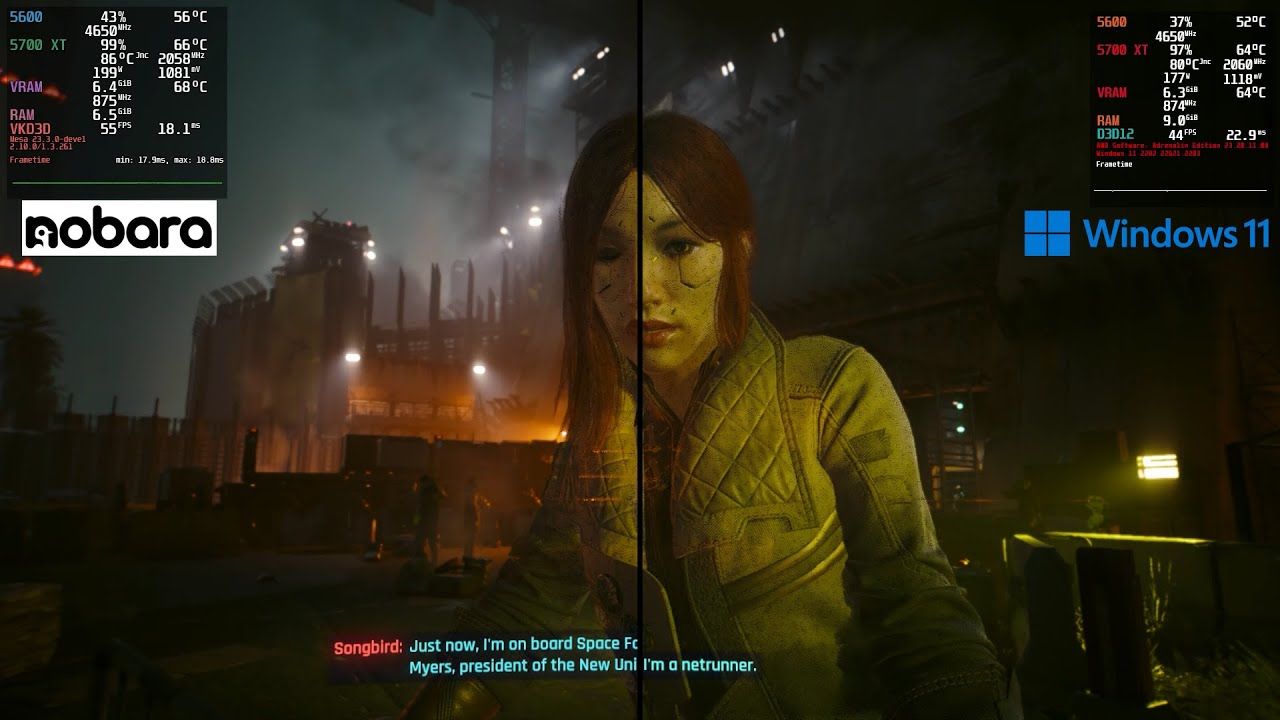The YouTube channel “Maximum Fury” conducted a technical test of the new Cyberpunk add-on called “Phantom Liberty” on an older AMD hardware system, testing it separately on Linux and Windows 11. The Linux system, specifically the Fedora distribution called Nobara, performed significantly better, delivering 31% more frames compared to Windows 11.
The hardware used for testing included an Asrock B550 motherboard with an AMD Ryzen 5 5600 CPU and an AMD Radeon RX 5700 XT GPU from the first RDNA generation, along with 16 GB of DDR4 RAM. The CPU, RAM, and GPU were overclocked, and the system utilized undervolting to save energy costs.
When testing the game at 1080p resolution with high textures, the Linux system achieved an average of 63.72 frames per second (fps), while Windows 11 managed only 48.55 fps. This suggests that the game should run noticeably smoother on the Linux system.
A 30% increase in performance just might get gamers to switch over to the new operating system.
Hell that is the difference between a better graphics card for some people. It’s like getting a free overclock, just for going outside your comfort zone.
This is a rare and extreme case, which is probably caused by some sort of fluke in the testing method or due to a bug in the game that Linux is handling better. Usually gaming on Linux is like ~5-10% slower for GPU-bound games.
linux users still coping
nobody likes linux yall are chatting in an echo chamber. lemmy feels like a comp sci major college party lol
It’s a well known fact that every second major release of Windows is crap.
- Windows 95 was not the best.
- Windows 95OSR2 was the one you wanted.
- Windows 98 sucked.
- Windows 98 2nd ed. worked as the former should have.
- Windows 2000 was great but had no support for running games.
- XP solved that and made people leave Windows 98 (I deliberately left out the clusterf… Windows ME.).
- Windows Vista sucked balls.
- Windows 7 was what Vista should have been.
- Windows 8? Metro on phones, yes! On desktop? No no no.
- Windows 10 got Microsoft back on track again.
I thought the new upgrade scheme (2 editions per year) Microsoft introduced with Windows 10 would be like “every second release will suck” but it started to look like Microsoft were able to break the curse…
…and then Windows 11 happened.
I ran 2000 back in the day and didn’t really have any problems with it. IMO it breaks the pattern somewhat. XP was better, of course, but 2000 was a good OS.
definitely believable
16gb ddr3 ram
ten year old i5
rx580 8gb
arch linux gnome desktop
standard prebuilt dell pc
have two of these machines built and operating in the house both are able to play modern games including Hogwarts Legacy low settings at 60fps no ray tracing
some games run fine with medium or high
some games such as Hogwarts Legacy and Marvel’s Spider-Man Remastered require a per game specialized wine wrapper script that is usually already made by an awesome entity unless you go through the steam launcher and then it just plays like a steam deck
https://en.wikipedia.org/wiki/Steam_Deck
“Steam Deck runs SteamOS version 3, based on the Arch Linux operating system. While SteamOS had been previously developed for Steam Machines using Debian Linux, Valve stated that they wanted to use a rolling upgrade approach for the Deck’s system software, a function Debian was not designed for but was a feature of Arch Linux. An application programming interface (API) specific for the Steam Deck is available to game developers, allowing a game to specify certain settings if it is being run on a Steam Deck compared to a normal computer. Within the Steam storefront, developers can populate a special file depot for their game with lower-resolution textures and other reduced elements to allow their game to perform better on the Steam Deck; Steam automatically detects and downloads the appropriate files for the system (whether on a computer or Steam Deck) when the user installs the game”
Even Valve can’t help but tell everyone that they run Arch.






